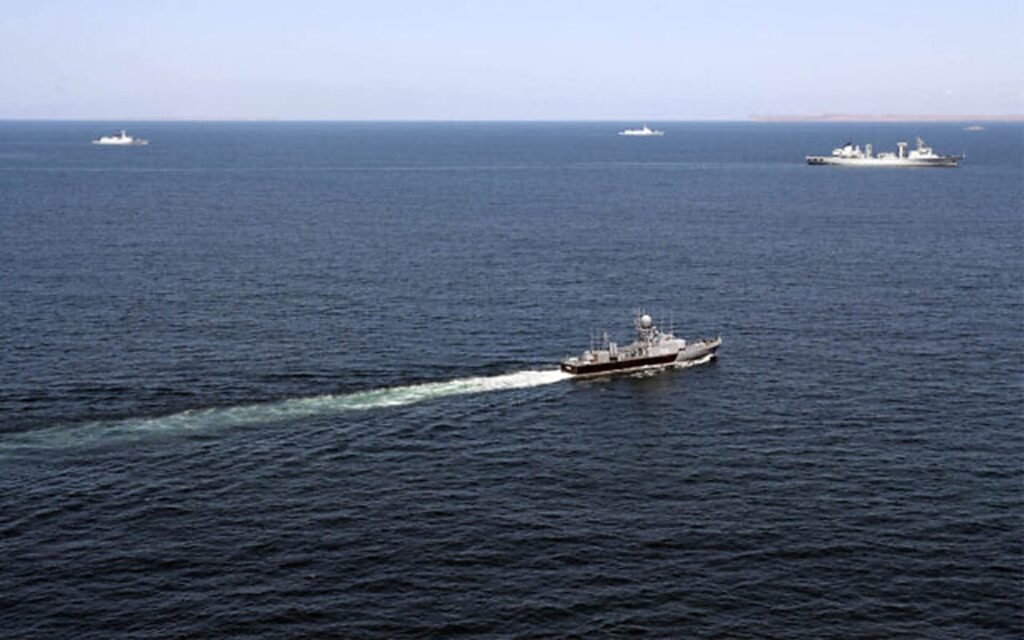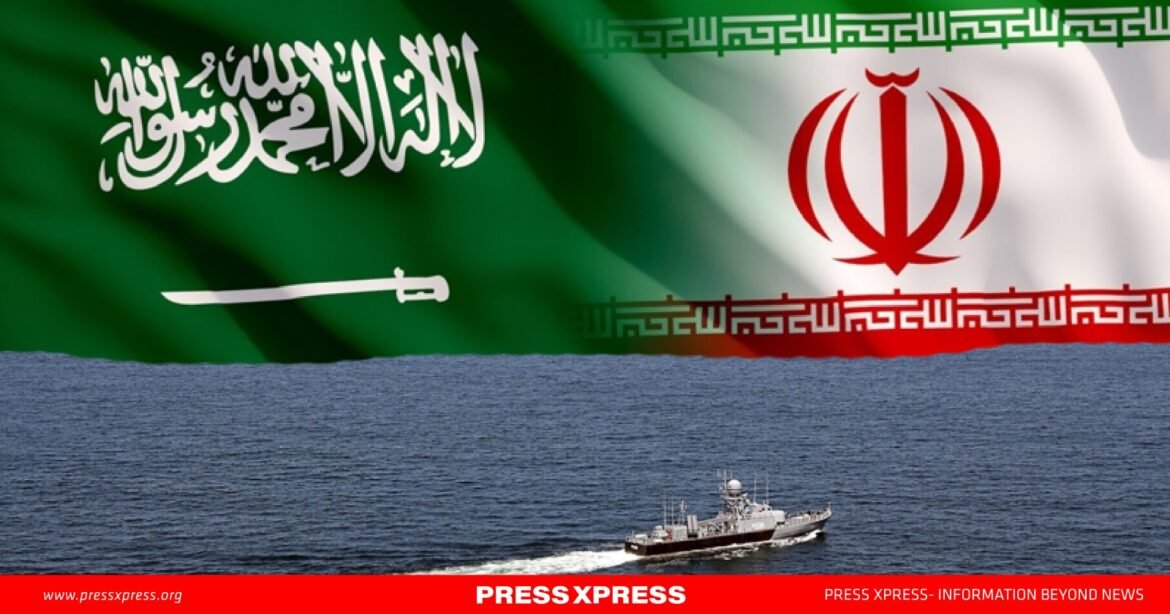Saudi Arabia and Iran, two regional rivals for decades, recently conducted joint naval exercises in the Sea of Oman, marking a significant turn in their complex relationship.
The move, confirmed by Saudi Ministry of Defence spokesman Brigadier General Turki Al-Malki, signals a cautious yet strategic cooperation between the two Middle Eastern powers, who were often at odds.
“The Royal Saudi Naval Forces had recently concluded a joint naval exercise with the Iranian Naval Forces alongside other countries in the Sea of Oman,” said Brigadier General Turki al-Malki on Wednesday.
Against the backdrop of the Gaza conflict, these drills highlight an emerging shift in Middle Eastern geopolitics as countries in the region reassess their alliances and approaches to security, away from a traditionally U.S.-led framework.

Islamic Republic of Iran Navy fast attack craft IRIS Zereh (P235) at sea during the “Maritime Security Belt 2024” combined naval exercise between Iran, Russia, and China in the Gulf of Oman, in an image released on March 12, 2024. (Photo: AFP / IRANIAN DEFENSE)
A New Chapter in Saudi-Iran Relations
The Sea of Oman naval exercises follow a landmark reconciliation deal in 2023 brokered by China, where Riyadh and Tehran formally reestablished diplomatic ties, ending years of estrangement. Relations between the two countries soured in 2016 after attacks on Saudi diplomatic facilities in Iran, and tensions had remained high, exacerbated by regional proxy conflicts and rivalry. This rapprochement, underscored by joint exercises, would have been unthinkable just a few years ago. Still, China’s intervention brought Riyadh and Tehran to the negotiating table, helping to reset one of the region’s most entrenched divisions.
Iranian officials have indicated that further military cooperation is in the pipeline. According to Iranian Naval Commander Admiral Shahram Irani, Saudi Arabia has proposed additional exercises in the strategically significant Red Sea, signaling an intent to deepen ties in maritime security.
The drills add a new layer of strategic importance, with Iran and Saudi Arabia seeking to stabilize their shared waters amidst growing tension in the region.
China’s Role as Diplomatic Mediator
China’s involvement as a peace broker marks a major shift in the Middle East’s diplomatic landscape. In recent years, Beijing has actively engaged in the region, emphasizing diplomacy and development over military alliances. The Saudi-Iran reconciliation, sealed under Chinese mediation, highlights a new avenue for conflict resolution, moving away from the historically U.S.-dominated geopolitical dynamic in the Middle East. By bridging gaps between these long-standing adversaries, China has underscored its influence as a regional power.
This approach contrasts sharply with Washington’s policy, often viewed as prioritizing security based on traditional alliances and immediate interests. For Saudi Arabia, which has long depended on U.S. security guarantees, aligning under Chinese mediation provides both a sense of strategic autonomy and an alternative model for securing regional peace.

As announced by China on March 10, 2023, Saudi Arabia and Iran, the latter two have reached a deal that includes the agreement to resume diplomatic relations and reopen embassies and missions within two months. (Photo: Chinese Ministry of Foreign Affairs)
Regional Stability in the Shadow of the Gaza Conflict
The ongoing conflict in Gaza has introduced new dimensions to regional security calculations. Heightened tensions between Iran and Israel have led Tehran to intensify its outreach to neighboring countries, including Saudi Arabia, with calls to limit U.S. military activities within their territories. Saudi Arabia’s invitation to Iran for future naval drills in the Red Sea reflects Riyadh’s cautious approach to managing its security independently, aiming to shield the region from potential escalations linked to U.S. policy in Gaza.
Data from recent diplomatic engagements suggest a growing disillusionment with U.S. foreign policy among Middle Eastern allies.
A number of Middle Eastern countries are reportedly re-evaluating their security strategies, as the Gaza conflict amplifies perceptions of the U.S. as overly aligned with Israel. This shift aligns with Saudi Arabia’s broader pivot away from exclusive reliance on Washington, as it increasingly seeks diversified security partnerships with non-Western powers, particularly China and Russia.
Implications for U.S. Influence in the Middle East
The Saudi-Iran military engagement adds pressure on the U.S. to reassess its Middle Eastern policy. Once seen as the region’s primary security provider, the U.S. now faces competition as countries like Saudi Arabia turn to alternative partners. With Saudi Arabia evaluating joining BRICS and actively engaging in military exercises with Iran, Washington’s influence is increasingly limited. The Gaza conflict, coupled with perceived U.S. unilateralism, is reshaping regional alliances, and Saudi Arabia’s outreach to Iran signals its commitment to reshaping security structures on its own terms.
Saudi officials have acknowledged a need for greater strategic autonomy, a sentiment echoed in Riyadh’s participation in regional exercises like IMEX 2024 and continued engagement with China. This indicates a shift towards an independent security model, where the Middle East’s largest players build alliances based on regional needs rather than external expectations.
A Reimagined Middle East
Saudi Arabia and Iran’s joint exercises point to a new era of regional cooperation, with Middle Eastern countries crafting a multi-polar security framework less reliant on traditional U.S. involvement. The proposed Red Sea naval exercises would symbolize this shift, establishing a precedent of collaboration between rivals to manage shared threats and promote stability.
The strategic reorientation of Saudi Arabia, highlighted by its growing ties with Iran and entry into BRICS, reflects the Middle East’s evolving diplomatic landscape. With the Gaza conflict bringing longstanding alliances into question, Saudi Arabia and Iran appear poised to lead a new phase of regional collaboration. This shift signals not only a thaw in relations between historic rivals but a broader movement towards a region defined by mutual interests and less bound by external influence.


